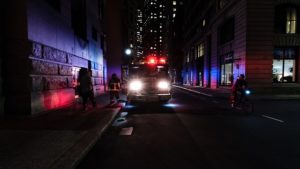Opioid Crisis Demands Uncomfortable Conversations
A recent discussion at a small group got so heated one member got up and stormed out. I see that as a microcosm of similar exchanges that will likely—if they haven’t already—spread across the nation.
Namely, what to do about drug addicts who repeatedly overdose and are rescued by emergency medical teams that administer naloxone (often sold under the brand name, Narcan)?
The issue came up when one member of the group observed that there were discussions at the state legislature about possible limitations on administering the life-saving antidote because of the expense.
Chimed in another, what should society do if EMS crews can’t get to someone suffering a heart attack because their time is occupied tending to addicts’ self-inflicted drug abuse?
Perplexing Problem

Soon after, he angrily departed.
Ironically, right after that exchange I saw a news story about a council member in Middletown, Ohio, suggesting the very thing that upset that man so much.
The Washington Post ran the story under a draconian-sounding headline: “One politician’s solution to the overdose problem: Let addicts die.”
Of course, the full tale was a little more nuanced.
Council member Dan Picard had proposed a “three strikes” plan to people who repeatedly overdose: too many and authorities wouldn’t send an ambulance to rescue them.
“My proposal is in regard to the financial survivability of our city,” Picard said. “If we’re spending $2 million this year (on the opioid epidemic) and $4 million next year and $6 million after that, we’re in trouble. We’re going to have to start laying off. We’re going to have to raise taxes.”
Multiple Chances
Picard backed off slightly from his comments after a national media storm erupted, saying he spoke as much in frustration as in suggesting a solution.
But his remarks are quite understandable, given the fact that one abuser in Middletown has received Narcan 20 times. (How many “second chances” should someone get?)
A family member with a friend who is a nurse has talked about the addicts have woken up after being administered naloxone and taken a swing at medical staffers, or complained the EMS workers had interrupted their high.
In mid-August, the EMS director in a nearby community told me in there are numerous addicts who shoot up, knowing the county will come out to administer Narcan. Then, state law allows them to refuse treatment—and the cycle continues.
No wonder Middletown has borne such expense. Another story pointed out that the city was on track to spend $100,000 this year on Narcan. It had only budgeted only $10,000.
Can you say, “Budget crisis”?
Change in Policy

Another from early June told of librarians in Philadelphia administering naloxone.
Obviously, the open-ended policy of administering naloxone to anyone, any time, for any reason isn’t working.
While I’m not suggesting Picard’s policy is reasonable, governments far and wide will have to figure out how to assess costs for the treatment.
It won’t be easy to recover money from people who have spent all their money on opioids. There are ways, though, be that attaching income tax returns, child-support checks or other forms of government support.
I’m not fond of increasing Uncle Sam’s snooping power, but the current situation demands we look at ways of restoring some fiscal sanity amid the opioid crisis.
We need more heated discussions, from council chambers to state legislatures to Congress.



One Response
We are not going to have a next generation if we don’t get this drug problem under control. I feel if someone overdoses requiring the Naloxone they should get manditory in-house treatment. A part of that treatment being to tell them the stories of people who no longer had a life after overdosing.After completing the treatment he or she could be required to work in one of the 26,000-56,000 jobs available in Louisville.
Comments are closed.